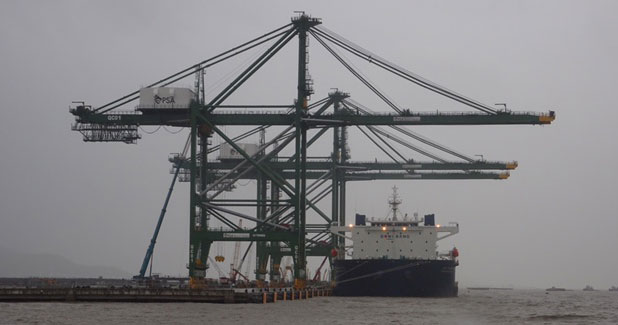
BMCT receives first batch of mega quay cranes
Bharat Mumbai Container Terminals Pvt Ltd (BMCT), a subsidiary of PSA International, received its first batch of three super-post panamax quay cranes in the lead-up to BMCT?s planned start of operations at the end of 2017. BMCT?s first cranes are twin-lift capable with a capacity of 65 tonne under the spreader and have an outreach of 63 m, making them capable of handling mega container vessels, which are 22 containers wide. The cranes were manufactured by Doosan Heavy Industries in Vietnam. A second batch of three quay cranes will be delivered in September 2017, with six more quay cranes being delivered during 2018 and 2019.
BMCT will also be receiving 18 rubber-tyred gantry cranes (RTGs) during 2017 to provide efficient yard operations, whilst the four rail-mounted gantry cranes (RMGs) arriving in September 2017 will be able to handle multiple 1.5 km long double-stack Dedicated Freight Corridor (DFC) trains, a unique capability amongst container terminals in India.
Suresh Amirapu, CEO, BMCT said, ?The arrival of our first batch of quay cranes, more than five months before BMCT?s planned commencement date, underscores our commitment to start operations on schedule. BMCT will be a game changer for India?s port and logistics market given its unprecedented size, scale and dedicated infrastructural links; and in particular its capabilities in handling trains from the Dedicated Freight Corridor.?
BMCT will also be receiving 18 rubber-tyred gantry cranes (RTGs) during 2017 to provide efficient yard operations, whilst the four rail-mounted gantry cranes (RMGs) arriving in September 2017 will be able to handle multiple 1.5 km long double-stack Dedicated Freight Corridor (DFC) trains, a unique capability amongst container terminals in India.
Suresh Amirapu, CEO, BMCT said, ?The arrival of our first batch of quay cranes, more than five months before BMCT?s planned commencement date, underscores our commitment to start operations on schedule. BMCT will be a game changer for India?s port and logistics market given its unprecedented size, scale and dedicated infrastructural links; and in particular its capabilities in handling trains from the Dedicated Freight Corridor.?


 +91-22-24193000
+91-22-24193000 Subscriber@ASAPPinfoGlobal.com
Subscriber@ASAPPinfoGlobal.com